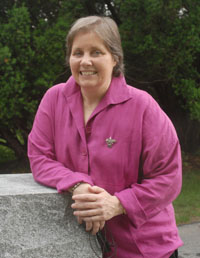LGBT suicide prevention conference shows local and national collaboration

Caitlin Ryan
Although there has been research dating back to the early 1970s on LGBT suicide risk, it wasn’t widely used by mainstream researchers or mental health care practitioners specializing in suicide prevention.
That was the message of Dr. Ann Haas, director of prevention projects for the American Foundation for Suicide Prevention (AFSP), at a recent gathering to focus on preventing suicide among LGBT people.
The “Symposium on LGBT Suicide Prevention: A Call to Action,” held in Waltham, Massachusetts, on June 18, drew more than 120 medical and mental health practitioners, social workers, leaders of LGBT organizations, and policy makers.
The meeting was sponsored by Greater Boston chapter of the AFSP and represented the first time a local chapter of AFSP has held a conference focused on the LGBT community. And AFSP officials are hopeful it is a meeting that will serve as a model for similar gatherings in other cities around the country.
Among the topics in focus at the symposium were creating safe spaces for LGBT people from youth through old age, the role of the media, making LGBT mental health a public policy priority, the impact on mental health of both coming out and social stigma, and suicide prevention in transgender communities.
Nancy Farrell, symposium co-chair and a board member of the Greater Boston chapter of AFSP, said the decision to hold the symposium predated the recent media attention on LGBT suicide.
The national AFSP organization sponsored a 2007 conference in partnership with the Gay and Lesbian Medical Association and the Suicide Prevention Resource Center. Attendees looked at the state of knowledge, how to apply what was known, and where further research was needed. Out of that conference came a 40-page consensus report, published in the January 2011 issue of the Journal of Homosexuality.
That paper, with Haas as the lead author, influenced the creation and direction of the Boston chapter’s conference, said Farrell.
At the June 18 meeting, Haas noted that two previous national reports on suicide prevention—the U.S. Department of Health and Human Services’ 2001 “National Strategy for Suicide Prevention” and the Institute of Medicine’s 2002 “Reducing Suicide, a National Imperative,” included little about the LGBT community. “Reducing Suicide” devoted a page and a half to discussing gay youth as a risk group, Haas said, but there was nothing in the 300-page report about the reasons for that risk or about LGBT adults.
Also at the symposium was keynote speaker Dr. Caitlin Ryan, director of the Family Acceptance Project at San Francisco State University. Ryan told the audience about her experiences as a practicing social worker helping LGBT youth and about the results of her research.
She said it is important to change an outdated mindset that families are the “enemies” of LGBT youth. Families that reject their LGBT children, she said, often do so out of an underlying sense of concern about the harm that might befall them because they are LGBT. By helping these families to see the impact of their rejection of their children, Ryan said, we can better help them to support their LGBT children.
Ryan said her Family Acceptance Project has created tools for helping both families and health care professionals and that she is trying to raise money to make them available more widely and for a wider range of literacy levels. (They are currently available in English and Spanish at familyproject.sfsu.edu)
Ryan also credited that the Greater Boston chapter of Parents, Families and Friends of Lesbians and Gays as “the leader in the country in taking our work and turning it into practice” through their work with families and youth.
AFSP officials said they will be preparing a memo for other ASFP chapters about the event, including details of partners, program, costs, and breakout session discussions. Farrell said a few chapters in other states have expressed interest in sponsoring similar events.


Leave a Reply